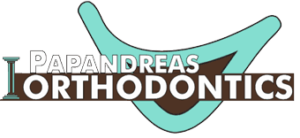CARING FOR ORTHODONTIC APPLIANCES
Congratulations!!!! You are now on your way to having a great smile and improved bite. Orthodontics will be a journey whose final destination can be enjoyed for life. To achieve this we must work together. Be extra careful the first 24 hrs as the glue for the braces has yet to achieve full strength, hence macaroni, soup, and mash potatoes only until tomorrow!
Keep your teeth and appliances clean.
Cavities, stains, and gum disease develop rapidly. Orthodontic appliances do not cause these problems, poor home care does. Job #1 is proper brushing and flossing after every meal, supplemented with the fluoride rinse Phos-Flur by Colgate, available at your pharmacy; do not substitute. The added benefit of a clean mouth is that teeth move more quickly through healthy gums. Routine checkups and cleanings with your regular dentist should be maintained. P.S. Try flossing while watching TV!
Avoid hard foods.
Hard and chewy foods break braces, expanders, and distort wires and bars. This can affect the final result and length of time in appliances. Job #2 is to avoid eating certain foods. A partial list of hard foods to avoid: hard candy, hard fruits / vegetables, Fritos, Doritos, pretzels, peanuts, hard rolls, bagels, pizza crust, granola bars, ice, popcorn, hard/crunchy cereals, finger nails, pencils, and pens.
Avoid high sugar foods.
You must also avoid sticky, chewy foods high in sugar as these become lodged in your appliances. The inability to adequately remove this food allows large stains and/or cavities to quickly develop. A partial list of sticky foods to avoid: gum (sugarless as well!), taffy, caramels, gummy bears, fruit roll-ups, Juju Beans, jelly beans, licorice, Starbursts, Skittles.
Sore Teeth
Sore Teeth can be expected after appliance, new wire, or rubber band delivery. If necessary, your normal pain medication will address this discomfort; Dr. Papandreas does not recommend prescription medications.
Irritated Tissues
Irritated tissue inside the lips/cheeks/side of tongue can occur as you adjust to new appliances. Typically this lasts about one week. Intraoral wax is always available at our front desk to place over the irritating portions of the brace; preferably the sooner you can go without ‘waxing’ the better. Topical anesthetics are fine to use (OraJel, OraBase, Ambesol), but limit their use to critical times such as bed time since their effect wanes quickly.
Wires Poking Gum or Back of Mouth
Wires poking the gum or back of the mouth may arise as teeth slowly straighten. Wax may again be used until you contact the office for a visit to clip wire ends. If you are unable to see us, the drugstore may sell a tool specifically for cutting orthodontic wires.
Wires Pulled Out of Tubes
Wires pulled out of tubes results when hard or chewy foods over-flex the wires. If causing discomfort, you can attempt to slide the wire back into the tube or if necessary cut the misplaced portion. Be careful not to dislodge appliances!
Loose or Broken Appliances
Loose or broken appliances…bring them in with you! This can be caused when eating improper foods, or even without food when upper teeth bump a lower brace. If this occurs, please call for an appointment. At that time, Dr. Papandreas will assess if and when a broken appliance needs to be repaired, usually we will try to repair it on the spot for you. Broken appliances can slow treatment and result in additional charges.
Trauma to Face / Jaw / Teeth
Trauma to the face, jaw, and teeth is fortunately a rare occurrence. Always wear a mouthguard when participating in contact sports. Stock mouthguards are available free of charge and custom ones for a nominal fee through our office. Do not form mouthguards too tightly as this will interfere with tooth movement.
Swallowing or Aspirating
Swallowing or aspirating a loose brace, rubber band, spacer, or appliance key or bar can occur if not careful. Which item and how taken internally determines the appropriate course of action. Regardless of event you must call the office immediately.
Jaw-joint Discomfort
Jaw-joint discomfort is rare during orthodontics, usually temporary, and commonly lasts only a few days. Notify the doctor if problems appear greater than this.
DOWNLOAD A PDF COPY OF THIS GUIDE
Papandreas Orthodontics and the American Association of Orthodontists recommends a specialist evaluate every adult, and all children no later than the age of 7. Although treatment for kids rarely begins at age 7 the early detection of impending problems always leads to a simpler, less expensive future solution via proper timing. Dr. Papandreas provides the initial consultation with records and follow-up observations at no charge to all kids and adults. No referral is necessary for you or your child (you can also share this info with a friend); CLICK HERE to set a visit now. Do not hesitate pursuing this evaluation regardless of perception that ‘all is ok’, as many problems are not easily identifiable except by the Certified Orthodontic Specialist©.
